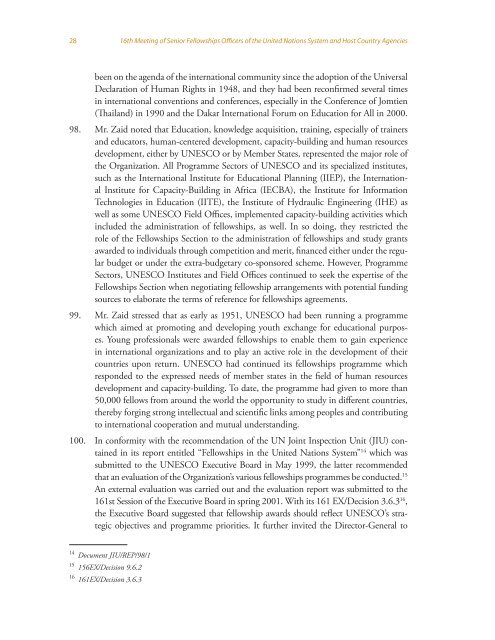16th Meeting of Senior Fellowships Officers of the ... - Development
16th Meeting of Senior Fellowships Officers of the ... - Development
16th Meeting of Senior Fellowships Officers of the ... - Development
You also want an ePaper? Increase the reach of your titles
YUMPU automatically turns print PDFs into web optimized ePapers that Google loves.
28<br />
<strong>16th</strong> <strong>Meeting</strong> <strong>of</strong> <strong>Senior</strong> <strong>Fellowships</strong> <strong>Officers</strong> <strong>of</strong> <strong>the</strong> United Nations System and Host Country Agencies<br />
been on <strong>the</strong> agenda <strong>of</strong> <strong>the</strong> international community since <strong>the</strong> adoption <strong>of</strong> <strong>the</strong> Universal<br />
Declaration <strong>of</strong> Human Rights in 1948, and <strong>the</strong>y had been reconfirmed several times<br />
in international conventions and conferences, especially in <strong>the</strong> Conference <strong>of</strong> Jomtien<br />
(Thailand) in 1990 and <strong>the</strong> Dakar International Forum on Education for All in 2000.<br />
98. Mr. Zaid noted that Education, knowledge acquisition, training, especially <strong>of</strong> trainers<br />
and educators, human-centered development, capacity-building and human resources<br />
development, ei<strong>the</strong>r by UNESCO or by Member States, represented <strong>the</strong> major role <strong>of</strong><br />
<strong>the</strong> Organization. All Programme Sectors <strong>of</strong> UNESCO and its specialized institutes,<br />
such as <strong>the</strong> International Institute for Educational Planning (IIEP), <strong>the</strong> International<br />
Institute for Capacity-Building in Africa (IECBA), <strong>the</strong> Institute for Information<br />
Technologies in Education (IITE), <strong>the</strong> Institute <strong>of</strong> Hydraulic Engineering (IHE) as<br />
well as some UNESCO Field Offices, implemented capacity-building activities which<br />
included <strong>the</strong> administration <strong>of</strong> fellowships, as well. In so doing, <strong>the</strong>y restricted <strong>the</strong><br />
role <strong>of</strong> <strong>the</strong> <strong>Fellowships</strong> Section to <strong>the</strong> administration <strong>of</strong> fellowships and study grants<br />
awarded to individuals through competition and merit, financed ei<strong>the</strong>r under <strong>the</strong> regular<br />
budget or under <strong>the</strong> extra-budgetary co-sponsored scheme. However, Programme<br />
Sectors, UNESCO Institutes and Field Offices continued to seek <strong>the</strong> expertise <strong>of</strong> <strong>the</strong><br />
<strong>Fellowships</strong> Section when negotiating fellowship arrangements with potential funding<br />
sources to elaborate <strong>the</strong> terms <strong>of</strong> reference for fellowships agreements.<br />
99. Mr. Zaid stressed that as early as 1951, UNESCO had been running a programme<br />
which aimed at promoting and developing youth exchange for educational purposes.<br />
Young pr<strong>of</strong>essionals were awarded fellowships to enable <strong>the</strong>m to gain experience<br />
in international organizations and to play an active role in <strong>the</strong> development <strong>of</strong> <strong>the</strong>ir<br />
countries upon return. UNESCO had continued its fellowships programme which<br />
responded to <strong>the</strong> expressed needs <strong>of</strong> member states in <strong>the</strong> field <strong>of</strong> human resources<br />
development and capacity-building. To date, <strong>the</strong> programme had given to more than<br />
50,000 fellows from around <strong>the</strong> world <strong>the</strong> opportunity to study in different countries,<br />
<strong>the</strong>reby forging strong intellectual and scientific links among peoples and contributing<br />
to international cooperation and mutual understanding.<br />
100. In conformity with <strong>the</strong> recommendation <strong>of</strong> <strong>the</strong> UN Joint Inspection Unit (JIU) contained<br />
in its report entitled “<strong>Fellowships</strong> in <strong>the</strong> United Nations System” 14 which was<br />
submitted to <strong>the</strong> UNESCO Executive Board in May 1999, <strong>the</strong> latter recommended<br />
that an evaluation <strong>of</strong> <strong>the</strong> Organization’s various fellowships programmes be conducted. 15<br />
An external evaluation was carried out and <strong>the</strong> evaluation report was submitted to <strong>the</strong><br />
161st Session <strong>of</strong> <strong>the</strong> Executive Board in spring 2001. With its 161 EX/Decision 3.6.3 16 ,<br />
<strong>the</strong> Executive Board suggested that fellowship awards should reflect UNESCO’s strategic<br />
objectives and programme priorities. It fur<strong>the</strong>r invited <strong>the</strong> Director-General to<br />
14<br />
Document JIU/REP/98/1<br />
15<br />
156EX/Decision 9.6.2<br />
16<br />
161EX/Decision 3.6.3

















